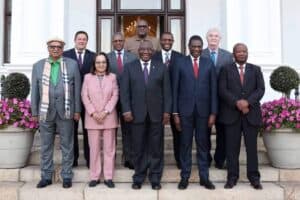As if he doesn't have enough legal problems, the former president may have put himself in the line of fire to be prosecuted as a knowing accomplice of crime.

Jacob Zuma, as former president of South Africa and of the ANC, may have gone a step too far when he acknowledged knowing about corruption on Friday outside the Durban High Court – and the Hawks have now taken an interest.
“We have taken note of the former president’s claims,” said Hawks spokesperson Hangweni Mulaudzi.
“Like any other responsible person, he must report the claims to the relevant authorities.”
However, Wits associate law professor James Grant yesterday said Zuma had in effect made himself an accomplice.
“He would run straight into what we call accomplice liability which is the moment he would have assisted [in crime], either positively or negatively, or by inaction or by omission – then he may be liable as an accomplice,” said Grant.
Charges of defeating the ends of justice or obstructing an investigation “paled” in comparison to the seriousness of being deemed an accomplice, Grant noted.
“Being an accomplice is virtually doing the deed, except that you are only saved from being convicted of the deed itself by virtue of the peculiarity of the definition,” said Grant.
“The best example of this was the old definition of rape. If you assisted somebody by, for instance, holding a woman down while somebody else raped her, you couldn’t be convicted of rape – only the person who committed the act could be.
“But you could be convicted as an accomplice, and now this remains the truth and correct: You can be sentenced and receive the same sentence as the person who committed the deed.”
In other words: If Zuma knew a crime or crimes had been committed, not informing the police about them made him complicit in their commission by covering them up.
And now that Zuma has made the extraordinary admission, the Directorate for Priority Crime Investigation (aka Hawks) was bound to investigate, Grant noted.
“Here’s another thing: There’s an argument that state capture actually amounted to treason and I think there is quite something to that argument. If Zuma was aware and had details relating to it, he is under another obligation to inform the authorities,” said Grant.
“If he is indicating he has special knowledge relating to the unconstitutional exchange of state power then he is obliged, and it is an offence for him to keep quiet. But there is no question he would probably escape – and probably thinks he’s safe – because he doesn’t fall into the category of corruption. But he would most likely fall into the catch-all of being an accomplice.”
Last week the South African Communist Party noted at its 14th Congress Fourth Plenary Session a “key priority now is to push forward with rolling back and dismantling the networks of parasitic looting of public resources that flourished under the patronage of former president Jacob Zuma”.
It is believed Zuma’s remarks on Friday and on Wednesday at a Congress of South African Students that event he shouldn’t be “provoked” were aimed at the SACP’s statement.
“Some call me corrupt, but they don’t say what it is that led them to say that. In fact, some of them – I know in fact that it is them who are corrupt – I could easily let out their secrets,” said Zuma.
SACP spokesperson Alex Mashilo said in reaction: “It is important first and foremost to seek truth from facts and thus depart from facts in considering whether there is a need for or in deciding a response.
“The hard fact is that Zuma did not mention the name of the SACP or any one of its leaders. This is an important point of departure. The rest are circumstantial deductions.”
Mashilo said Zuma had been making the same threats about the arms deal following the June 2005 decision by then president Thabo Mbeki to relieve him of his duties as the deputy president of the republic.
“This is continuing, 13 years later. It is also important to underline that, in terms of the rule of law in South Africa, concealing any knowledge of corruption, let alone for such a long time, is itself tantamount to corrupt conduct or complicity in corruption.”
“There is no need for a further response, at this stage, since Zuma did not expressly mention the name of the SACP or any one of its leaders in making his allegations. The SACP and its leaders, however, strictly reserve their rights in law, in addition to dismissing insinuations that seek to cast aspersions on the party and its leaders.”






